International Research Journal of Engineering and Technology (IRJET) e-ISSN:2395-0056

Volume: 09 Issue: 12 | Dec 2022 www.irjet.net p-ISSN:2395-0072

International Research Journal of Engineering and Technology (IRJET) e-ISSN:2395-0056

Volume: 09 Issue: 12 | Dec 2022 www.irjet.net p-ISSN:2395-0072
SHUBHA K U1 , MAHESH SAJJAN2
1PG Scholar, Department of Civil Engineering, RYMEC, Ballari 2Assistant Professor, Department of Civil Engineering, RYMEC, Ballari
Abstract - There are various openings in reinforced concrete that are necessary for the proper operation of services like telephone lines, air conditioning, and ventilation ducts. due to this variation in the beams' structure, particularly when taking into account their curvature. When compared to other structural areas, the load distribution is more concentrated at the centre andatthecorners. Therefore, in order for the structure to withstand this load, it must be designed so that the weight can be distributed evenly across the curved beam. The nature of the curved beam's existence and how it functions in all potential areas where additional support is required must be studied by taking into account some of the key load distribution factors that are taken into account in finite element modelling. The product can be designed in Catia, and it has been assumed that only Catia software will be used to develop all models. The models are then imported into Ansys to be studied for the structure's proper behaviour. By conducting the initial research for this project, we learned that adding appropriate holes of various sizes and shapes can lessen the load distribution over curveshaped beams. In order to study the stress strain and total deformation, various holes with models have been designed and imported into ansys. The reinforced concrete beam is thought to have been well analysed in ansys when compared to the real-time model, where we must check the design repeatedly by building following repeated testing,withoutthe need for such additional costs and economic conditions while we can design multiple attempts and in order to attend the best possible analysis outcome.
The seismic load is nature's most awful and ephemeralmiraclebecauseofhowmuchdamageitcauses on a broad scale. This makes it a natural disaster. When seismicforcesshakeabuilding,humanlivesarenotdirectly lost;rather,theyarelostasaresultofthebuilding'scollapse, whichinturnplacesthelivesofthebuilding'sinhabitants and the value of their assets in jeopardy. In other words, humanlivesarelostindirectly.Thereisnotadirectriskto humanlifeassociatedwiththeshakingofabuildingcaused byseismicactivity.Whenforcesassociatedwithearthquakes orseismicactivityare applied,all structuresareat risk of beingdamaged.However,thechanceofdamageincreases considerably when the earthquake takes place on a tilted area,suchasonslopes,whichisatsomepropensitytothe ground.Thisisbecausethegroundismorelikelytomove
duringtheearthquake.Toputitanotherway,thepossibility of damage greatly increases when the earthquake takes placeonaslopedworkingsurface.Workingonslopesisan effort that should be avoided at all costs because to the inherentdangers.Thisoccursasaresultofhigherhorizontal powersonshortsegmentsonthetoughside,which,inturn, encouragestheinstallationofplasticpivotsasasolutionto theproblem.Inotherwords,theproblemiscausedbyhigher horizontalpowers.Buildingsthatarepositionedonslopes have a greater degree of both horizontal and vertical variation when compared to their counterparts that are placedonlevelground.Thisistrueforboththebuilding's interiorandoutsideenvironments.
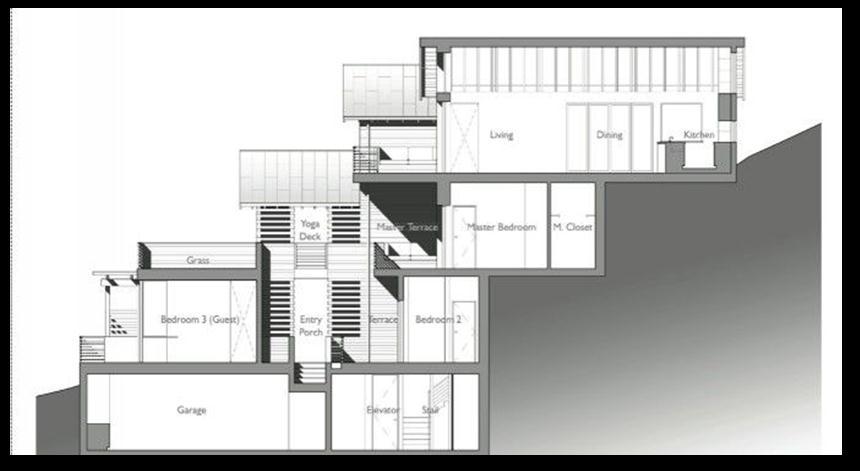
Usingmultipletypesofdamperssimultaneouslycan reducetheseverityofdamagecausedbyearthquakes.Based onhowwelltheyperform,thesedampersaredividedinto differenttypes.Dampersareusedbecauseoftheirabilityto absorb a lot of energy, be easily replaced, have a straightforward installation process, and work well with otherpartsofthebuilding'sframework.
Fluid viscous dampers are velocity-dependent systems, and the first fluid viscous damper devices were created for use in military applications. The fluid viscous damperconsistsofanopeningthroughwhichsomefluidis flowing, and the phenomena that is exploited for the operation of the fluid viscous damper is described below. Thereareanumberofchambersthroughwhichsiliconeoilis
International Research Journal of Engineering and Technology (IRJET) e-ISSN:2395-0056

Volume: 09 Issue: 12 | Dec 2022 www.irjet.net p-ISSN:2395-0072
continuously flowing. This oil is employed because of the reasonthatitisconsistentoveralongperiodoftime,itdoes not waver, and it is inert. Additionally, it is not toxic or hazardous,anditdoesnoteasilycatchfire.Thedifferencein potentialisproducedbythetwoseparatechambers.Because ofthis discrepancy,thepressureisadjustedsothattheoil may flowvia the designatedchannel. The energy from the earthquakeistransformedintoheatenergythroughoutthis phase,andtheresultingheatcausestheatmospheretocool.
Yogeendra Holebsgilu,R., andManjunath,P.Ona 3Dmonitorwith10layers,theYaxiswillshowmovement along four bayous and six straights, while the X axis will show movement along all 10 layers. There is a possibility that the slope of the land is either zero degrees, fifteen degrees downward, or twenty-five degrees upward. The model is deconstructed and planned for using the ETABS 2015 software, taking into account seismic zone V and a varietyofsoiltypes.Theyreasonedthatifthefoundationof the building were tilted up at a higher angle, the seismic strainonthebuildingwouldbelessened,andthebuilding's stability would rise. Analyzing the seismic behavior of RC buildingsonbothflatandslopingsurfacesrequiredSandip DoijadandSurekhaBhalchandra(2015)toapplyanumber ofdifferentsheardividerconfigurations.Thisresearchwas publishedin2015.TheG+8narrativeRCCteam,whichwas inchargeoftheinvestigation,wastakenintoconsideration. The study looked at sites with slopes of 9, 18, and 27 degrees, as well as areas that were completely flat. The inspectionwascarriedoutwiththeassistanceofSAP2000 softwarethathadbeenmodifiedforZoneIIandmediumsoil.
Birajdar and Nalawade (2004) didstudyonthe seismicbehaviorofbuildingslocatedonslopedterrain,and their focus was on how these structures reacted to earthquakes.Theleanof27degreeswasdiscoveredin24 differentRCframebuildings.Intermsoftheirarchitectural style, the buildings were either step-back, step-back setback,orset-back.BuildingsinseismiczoneIIIthatrangedin heightfromfourtoelevenstories(15.75to40.25meters) andhada totaloffourbays,threeof whichwereoriented perpendiculartotheslopeandoneofwhichwaspositioned perpendiculartotheslope,wereexamined.Theycarriedout thethree-dimensionalstudywiththehelpoftheResponse spectrumapproach,takingintoconsiderationtheinfluence oftorsion.
The purpose of this research is to examine and evaluatethedifferencesandsimilaritiesbetweentheseismic responsesofbuildingsthatareandarenotfittedwithfluid viscousdampers.
•Todeterminethevariousdisplacementsandvariationsin thestructurebothwhenafluidviscousdamperispresent andwhenit isnotpresentbycomparingthetwostatesin whichthedamperispresent.
• Using fluid viscous damping in RC buildings in order to analyze base shear oscillations in the structure so that a determinationcanbemadeaboutwhattodoaboutthem.
•Toinvestigatefurtheraspects,suchasshear,displacement, andtaledrift,andmakecomparisonsbetweenthem
•Examiningthedatasidebyside,makingcomparisonsand analysesofthem,andthendrawingconclusionsaboutthe impactthattheviscousdamperhasontheslopingbuilding.
Gradeofconcrete:M45
Gradeofsteel:Fe550 Beam:700×500mm Column:700×700mm. Onewayslab:200mm StoryHeight:3m Seismic Loads Z=V,I=1,R=5andSoilTypeisMedium
4.1 Layout of Buildings
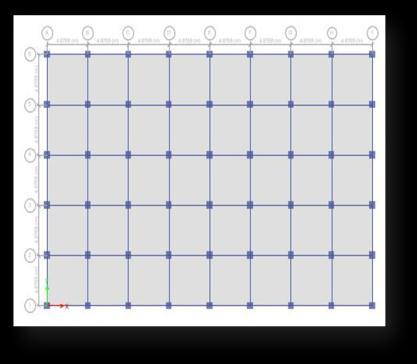
International Research Journal of Engineering and Technology (IRJET) e-ISSN:2395-0056
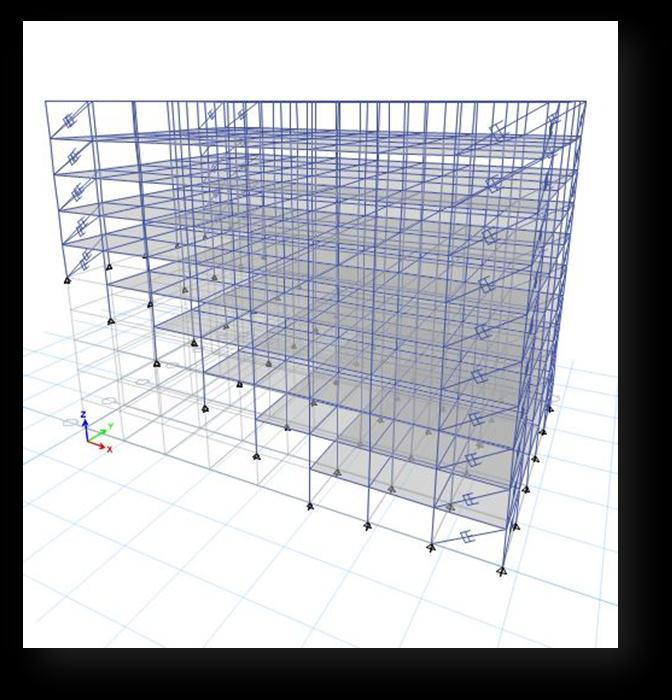
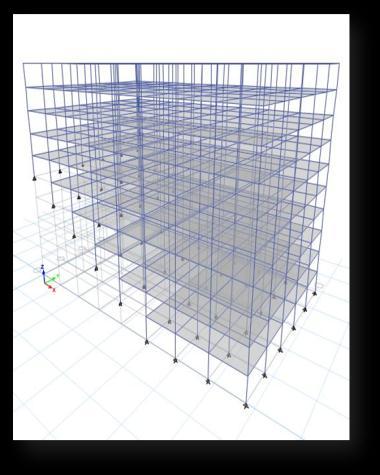
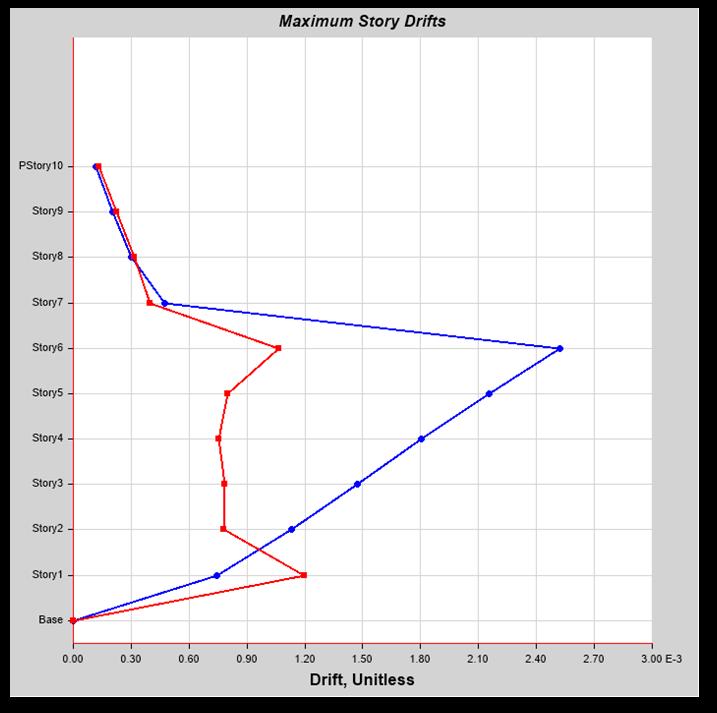
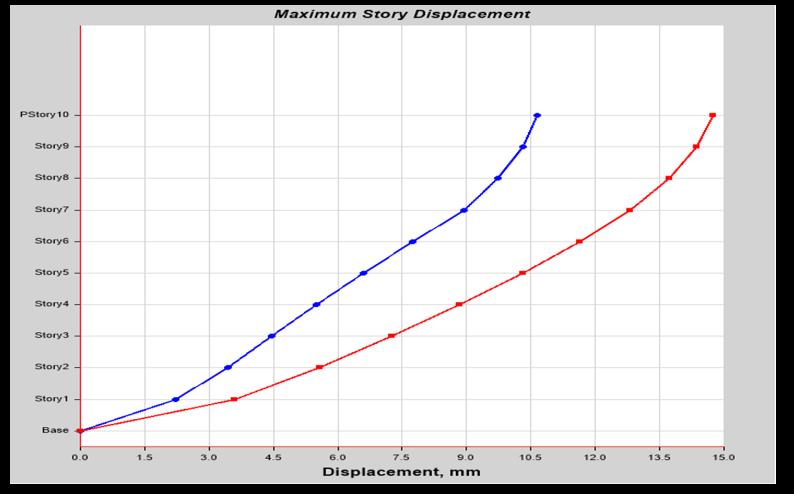

Volume: 09 Issue: 12 | Dec 2022 www.irjet.net p-ISSN:2395-0072
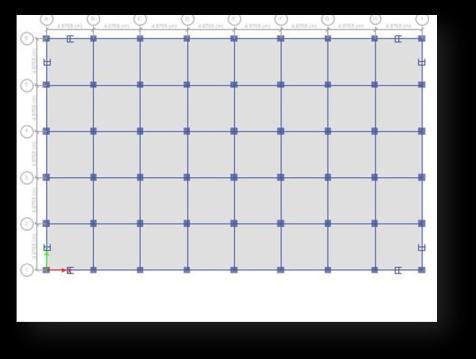
International Research Journal of Engineering and Technology (IRJET) e-ISSN:2395-0056
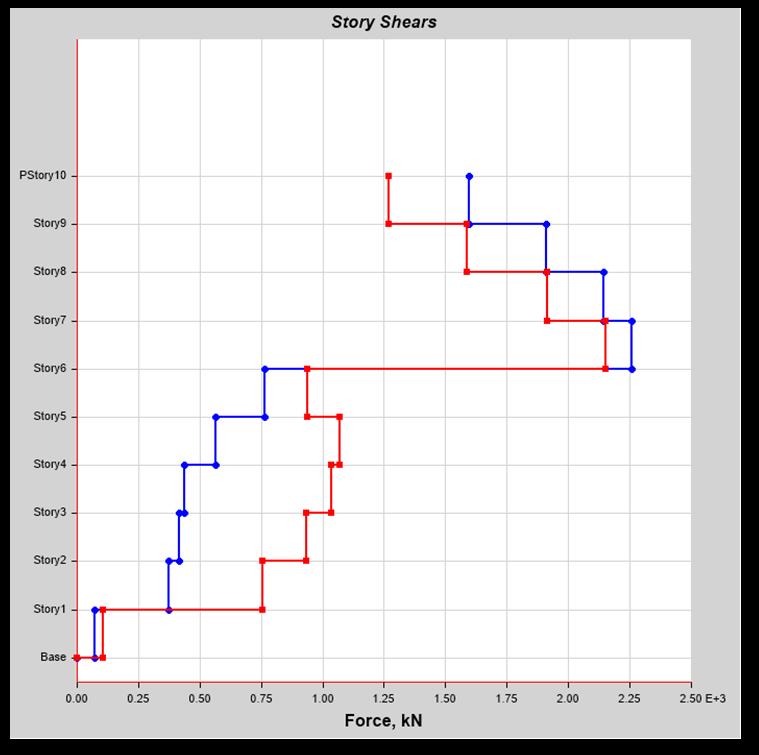
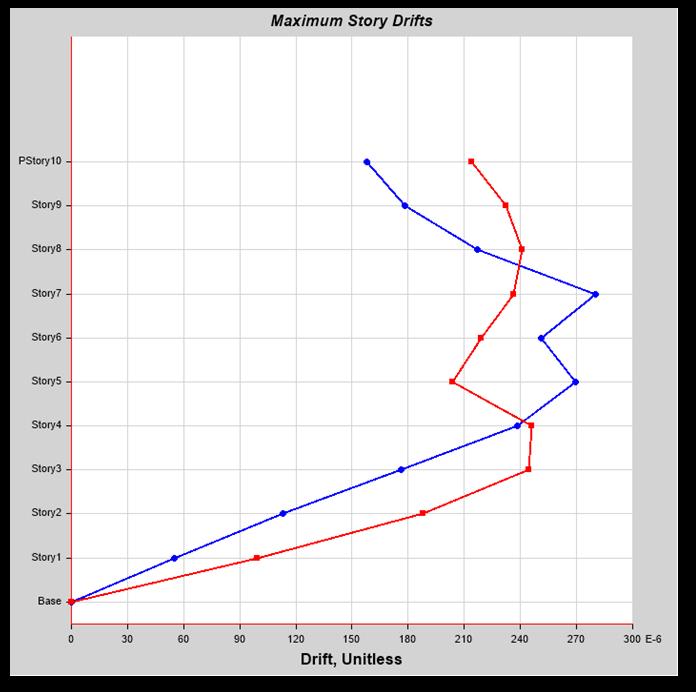
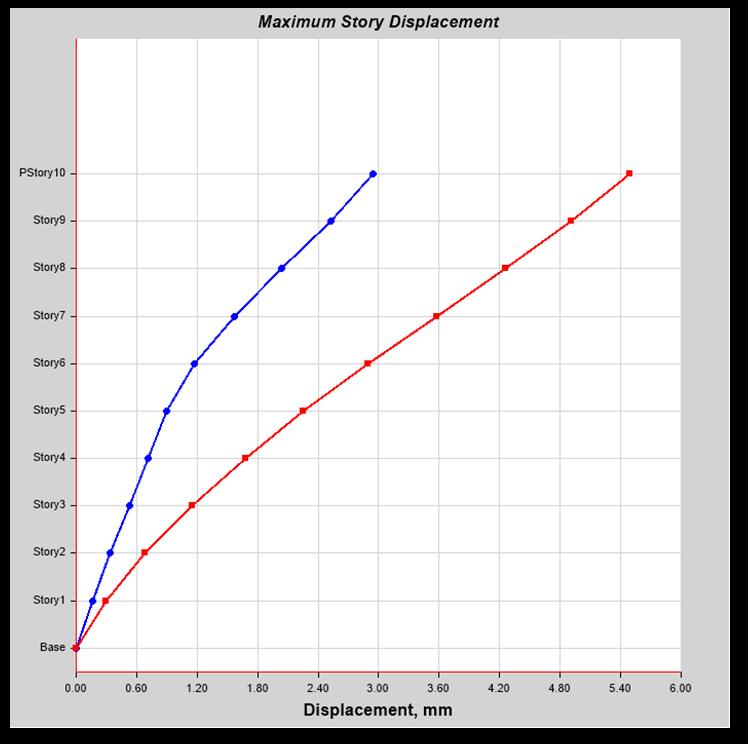
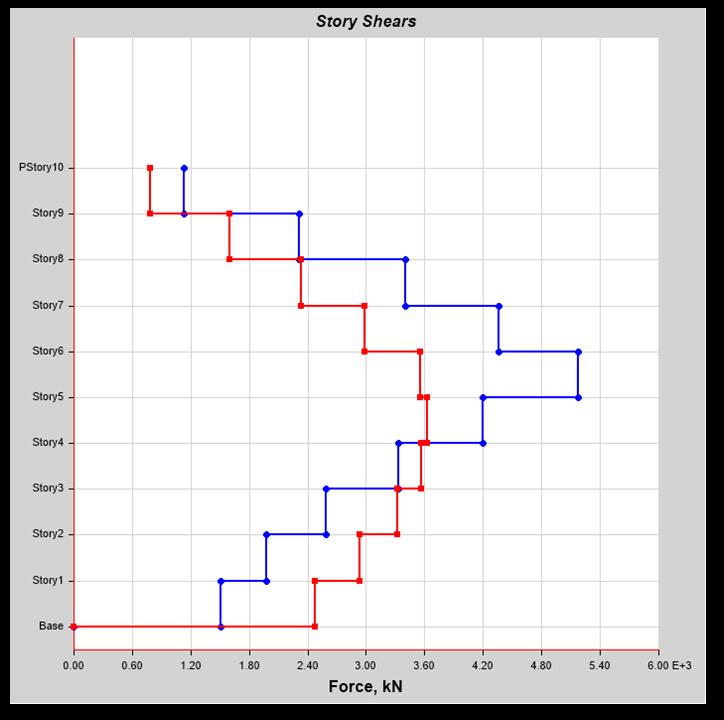
Volume: 09 Issue: 12 | Dec 2022 www.irjet.net p-ISSN:2395-0072

International Research Journal of Engineering and Technology (IRJET) e-ISSN:2395-0056

Volume: 09 Issue: 12 | Dec 2022 www.irjet.net p-ISSN:2395-0072
5.3 Comparison of Conventional RC Structure and Conventional RC Structure with Fluid Viscous Damper
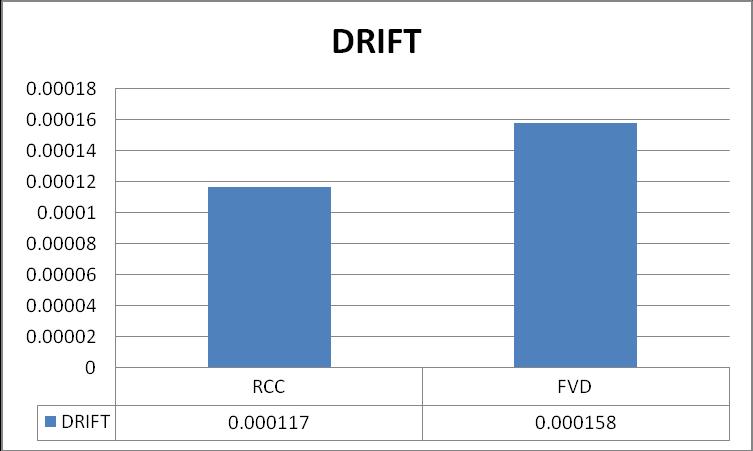
5.3.1 In X-Direction
Chart -7: Displacement(mm)forEQXLoad
3.Thereis28.95%increaseinthestoryshearsasshownin thechart9byprovidingtheviscousdampers.
5.3.1 In Y-Direction
Chart -10: Displacement(mm)forEQXLoad
Chart -8: StoryDriftforEQXLoad
Chart -11: StoryDriftforEQXLoad
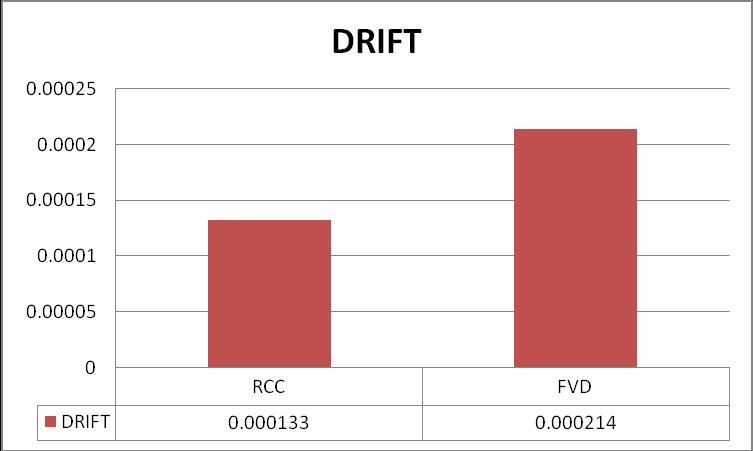
Chart -9: StoryShears(kN)forEQXLoad
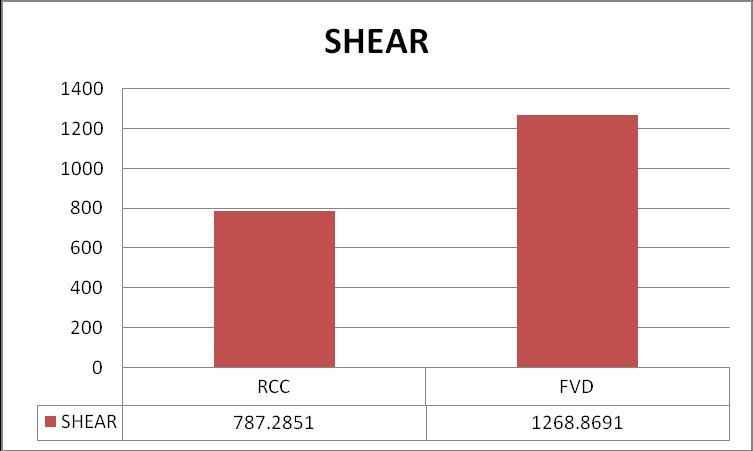
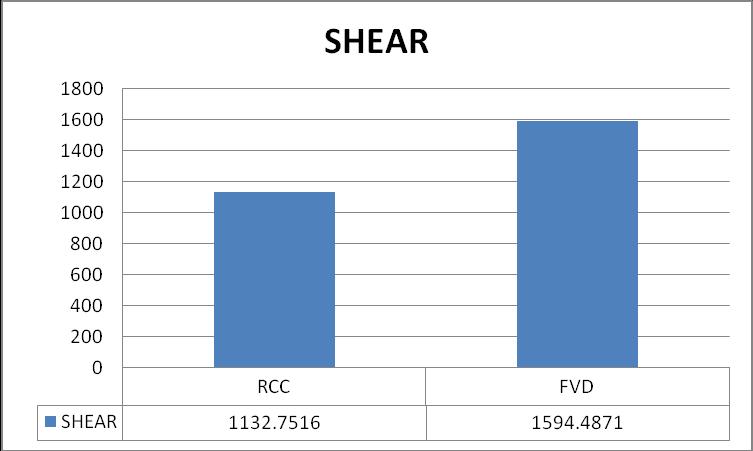
1. There is 72.4% decrease in the story displacement as showninthechart7byprovidingtheviscousdampers.
2.Thereis25.94%increaseinthestorydriftasshowninthe chart8byprovidingtheviscousdampers.
Chart -12: StoryShears(kN)forEQXLoad
1. There is 62.76% decrease in the story displacement as showninthechart7byprovidingtheviscousdampers.
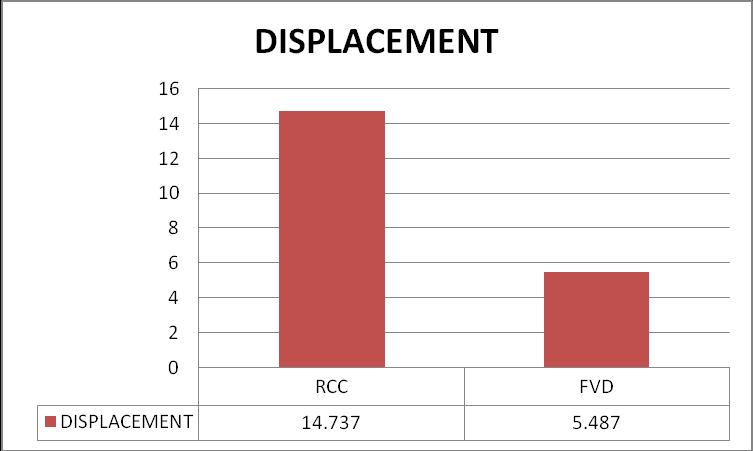
2.Thereis37.85%increaseinthestorydriftasshowninthe chart8byprovidingtheviscousdampers.
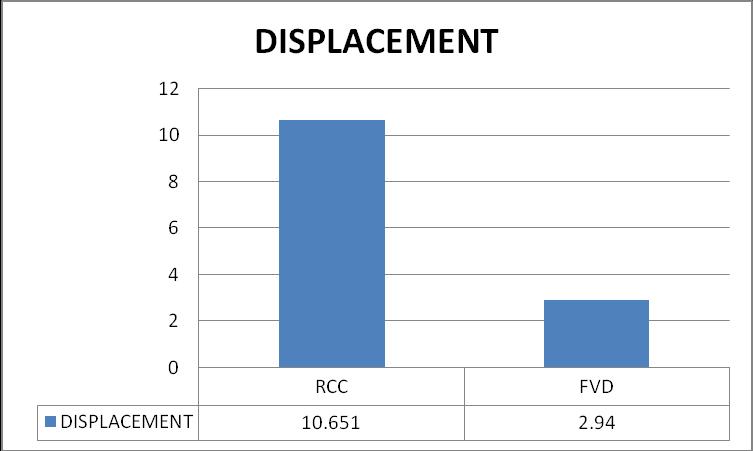
International Research Journal of Engineering and Technology (IRJET) e-ISSN:2395-0056

Volume: 09 Issue: 12 | Dec 2022 www.irjet.net p-ISSN:2395-0072
3.Thereis37.95%increaseinthestoryshearsasshownin thechart9byprovidingtheviscousdampers.
1. The final values that were produced for the damper model's displacement, drift, and shear reserveswerefoundtobeaccurateafterchecking theresultsofthefinalcomparisonfordisplacement, drift,andshear.1.
2.Aftergoingthroughallofthetablesandgraphs, wecametotheconclusionthatthecementdamper andshearwallmodelperformssignificantlybetter thanalloftheothermodels,whichhavelessvalue overall. After going through all of the tables and graphs, this was the conclusion that we came to. Even when taking into account the fact that the damper and shear wall model performs more effectively,thisfindingisstillaccurate.
3.Thefunctionalityofthemodelisalsoimproved when drift analysis is performed, which in turn improvestheperformanceofthedamperwhenthe valuesoftheforcesaretakenintoconsideration.
4.Whenconsideringtheshareforces,itisimportant totakeintoaccountboththeRCCmodel,whichis themodelofthedamperthatperformsbetter,and the normal model, which appears to be a better choice; consequently, it is important to take into account the model of the damper that performs well.
5. After taking into account all of the findings, including the displacement drift and story share values,wecanfinallyarriveattheconclusionthat the damper model is superior to all of the other modelswhenitcomestothedesignofslopesthat involveseveralstories.Thisisthecasebecausethe dampermodelaccountsfortheinteractionbetween thedisplacement driftandthestorysharevalues. Thisisindeedthesituation.
1.T.TSoong,B.F.SpencerJr,Supplementalenergydissipation state of the art and state of the practice, Engineering Structures24(2002),243-259.
2. Douglas P. Taylor, Fluid dampers for applications of seismic energy dissipationandseismic isolation, Eleventh WorldConferenceonEarthquakeEngineering,Paperno.798.
3.DouglasTaylor, PhilippeDuflot,Fluid viscousdampers usedfor seismicenergydissipationinstructures.
4. IS 1893(Part–1):2002,Indian Standard criteria for earthquake resistant design of structures –General provisionsandbuildings,BureauofIndianStandards,New Delhi
5.SP:6-1(1964),ISIHandbookforStructuralEngineersPart–1-StructuralSteelSections,BureauofIndianStandards,New Delhi
6.Liya Mathew, CPrabha, Effect of dampers in multistoreyedbildings,IMPACT:IJRET,Vol.2,Issue9,Sep2014,5964.